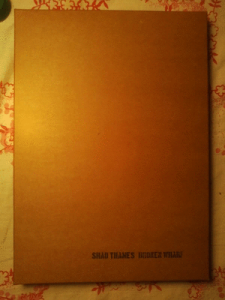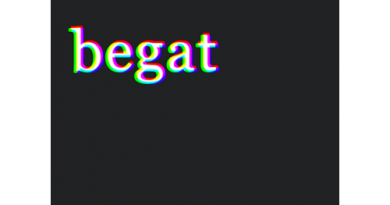‘Shad Thames, Broken Wharf’ by Chris McCabe
-Reviewed by Afric McGlinchey–
Shad Thames, Broken Wharf is a commissioned play, or script for a short film, written by Chris McCabe. Each book is presented in a box, with a genuine relic salvaged from the river. Nice touch.

The cast: Echo, a middle-aged woman from the locality, Blaise, a Northerner, the Landlord, a Londoner with ‘the knowledge’ and the Chorus, representing ‘The Restructure.’ Immediately there are resonances of Greek mythology (Echo was the name of a nymph who fell in love with Narcissus), Beckett, Joyce, Shakespeare, even Orwell’s 1984 (The Restructure). The language is poetic, sardonic, dark, comic: ‘Consider the Gherkin: a suppository for the arse they made of things.’
The Prologue opens with the Landlord locating the setting: ‘somewhere between a warehouse & a backstreet, between the Thames & the City.’ Then he goes on to describe how he became a Landlord, defining his role as something ‘between a bookmaker & a doorman, an undertaker & a prophet, a pharmacist & a cab driver…’ He continues, philosophically, so that in the end, the Landlord’s role encompasses every occupation from an historian to a Griffin, minute-taker, anarchist, semaphorist and poet. And more. This is a play full of lists.
The ‘white strobe from the tower’, which reflects across the river, across each glass he pours, symbolizes the ‘forever-time position of making the moment happen on canned-repeat – each time new, each time the same…’ Here is where I am reminded of Beckett’s Waiting for Godot, where the conversation endlessly repeats, where nothing happens, where there is always a sense of anticipation. The language is wonderfully poetic and rhythmic, with unexpected images: ‘the tides percolating sea-saliva, clawing the bladderwrack beach ….binbags hunched as done-in men….’. There are also striking and incongruous juxtapositions of location: ‘…somewhere between Deadman’s Dock & a shop called Joy.’ McCabe makes effective use of rhythm, assonance, alliteration, lists and repetition to ensure his audience’s rapt attention.
The opening dramatic monologue, which locates the story ‘somewhere between the dead fish & fresh bread, the bunker & the turret, between the commerce and the cormorant, the greed & the grebe….somewhere between tonight’s first shout & what she said at Shad Thames’ – sets up an expectation – of poetic language, of a conflict, and creates a suspense: what did she say? The lack of a full stop in the final sentence leaves everything open-ended.
In the opening scene, the two characters, Echo and Blaise, appear to be talking to themselves. At any rate, their comments seem unconnected to each other. We start to get a sense of the contemporary: ‘the pulse of the pyramid’; ‘this husk of a remote control, battery-side up, in the sand’. Echo describes the excavations and rebuilding: ‘They dug the bunker with tractors, diggers, cranes – it was like watching a nest of insects.’
She is bemused by all the activity, not able to concentrate on it ‘ – never knowing when he’d be back’
It is in fragmented suggestions like this that we get glimpses of her personal life.
Blaise lists items he finds in the river. Echo (whose dialogue is always rich with imagery) describes a book she found when the tide went out: ‘Have you ever seen a book thrown back by the river? It was open face-down like a drowned bird. I thought there might be a clue there. I picked it up – it was called Ulysses’
Blaise tells Echo (now they are beginning to have the semblance of a conversation together) about a friend of his, a bin-man, whose mate had a problem with ulcers. He found a copy of Ulysses in the bin, and read it because he thought it might help: ‘you know, being called ‘Ulcers’.
Echo talks in generalities. She mentions seeing seven species of birds. Blaise likes specifics: ‘what kind of birds?’ She lists them: ‘sparrows, starlings, tits, gulls, pigeons, blackbirds, crows’.
The conversation, and the journey she describes, goes round in circles, ‘or cyles’, as they buy round after round. The wisdoms they sprout are very Beckettian: ‘Never trust a man with a square watch’; ‘It’s men with small wrists who dig deepest in their pockets.’
As Blaise goes out for a ‘piss’, the voice of The Restructure is heard, introducing a more surreal note:
‘When the weather changes THE
RESTRUCTURE replaces the crunch of notes with shreds of gulls,
conceals phonebooks of evacuees under fresh snow
so the contacts are mulched under boot-treads –‘
Although The Restructure gives a description of sorts, it is atmosphere rather than logic, which is conveyed:
‘…THE RESTRUCTURE uses a spirit level
of grey tube to level out the overspill of marshes,
shunts under the river to make North and South a tabula rasa,
a straight run of twenty-five minutes without delays
(time enough to think but not act on how much you owe)’
(For me, a ‘spirit level’ will always bring Heaney to mind, and so, another echo…)
In the layers between these fragmented observations of the Landlord, the Restructure and the disjoined dialogue between Echo and Blaise, we begin to get a sense of cohesiveness: the objects unearthed from the riverbed symbolizing the history of Shad Thames, the evolution of its story. Echoes and repetitions continue the cycles and circles, symbolizing life: eggs, birds, snowflakes. Myth and legend surface in random fragments uttered: ‘Did I ever say that if the stone birds fly from the Liver Building the whole city crumbles back to earth?’
The conversation follows no specific topic, abruptly changing constantly, yet loops occur. The dialogue – such as it is – is broken by silences, which appear to be comfortable ones, or someone – this time, Echo – going for ‘a piss.’
The voice of The Restructure is heard again, with more riddles, surreal images and bizarre rules for a strange world:
‘THE RESTRUCTURE….positions fortune cookies
along the cobbles of wharves so subliminal messages
gum the soles of shoes; creates brutalist altars in converted
churches so new Gods can be seen from many perspectives,
ensures all citizens are buried with a coxcomb, a chicken and a
bell.’
Oh, McCabe is having fun! This is a text that also continues to subvert expectations. Magic occurs: ‘transforming fish to dancing coins’. Sometimes, spells are more like curses (as with the witches in Shakespeare’s MacBeth): ‘….THE RESTRUCTURE mixes mercury
with syphilis to ensure mental collapse follows erectile dysfunction’.
There is gambling, with ‘the splenetic lighthouses of fruit machines’. Sometimes there’s the sense of a reversal of time to a Dickensian world: ‘THE RESTRUCTURE has already placed penny bets on fortunes in the smouldering quays of Galley, Dice and Smart’. And let’s not forget the ghosts in the churchyard of St Mary’s: it was like a canteen, a canteen for ghosts’. McCabe spins us, not only through time warps, but also through the literary worlds of the great classicists – back to Beckett again:
Blaise: ‘It’s a parallax!
Echo: ‘It’s a trick of perspective!’
Blaise: ‘It’s a dupe for terrorists!’
Echo: ‘It’s a maze for drunkenness!’
And Shad Thames, Broken Wharf, is, indeed, all these things. Amidst the piss, the alcohol, the river, flows the drunken drivel of two characters reflecting on transient moments in their lives, the history of this corner of the world. I even detect a hint of Paul Muldoon in Blaise’s sound epiphany of: ‘Black dock of Salthouse, black dock of Blitz; black dock of Brunswick, black dock of silt; black dock of brandy…. ‘etc. And The Restructure adds and deletes contacts – like Facebook or other social sites… this is an impressionist, fragmentary take on the dregs left behind by civilization, past and present, in all its mess and glory. Rather ambitious for a slim play. McCabe pulls it off though. Loved this.


